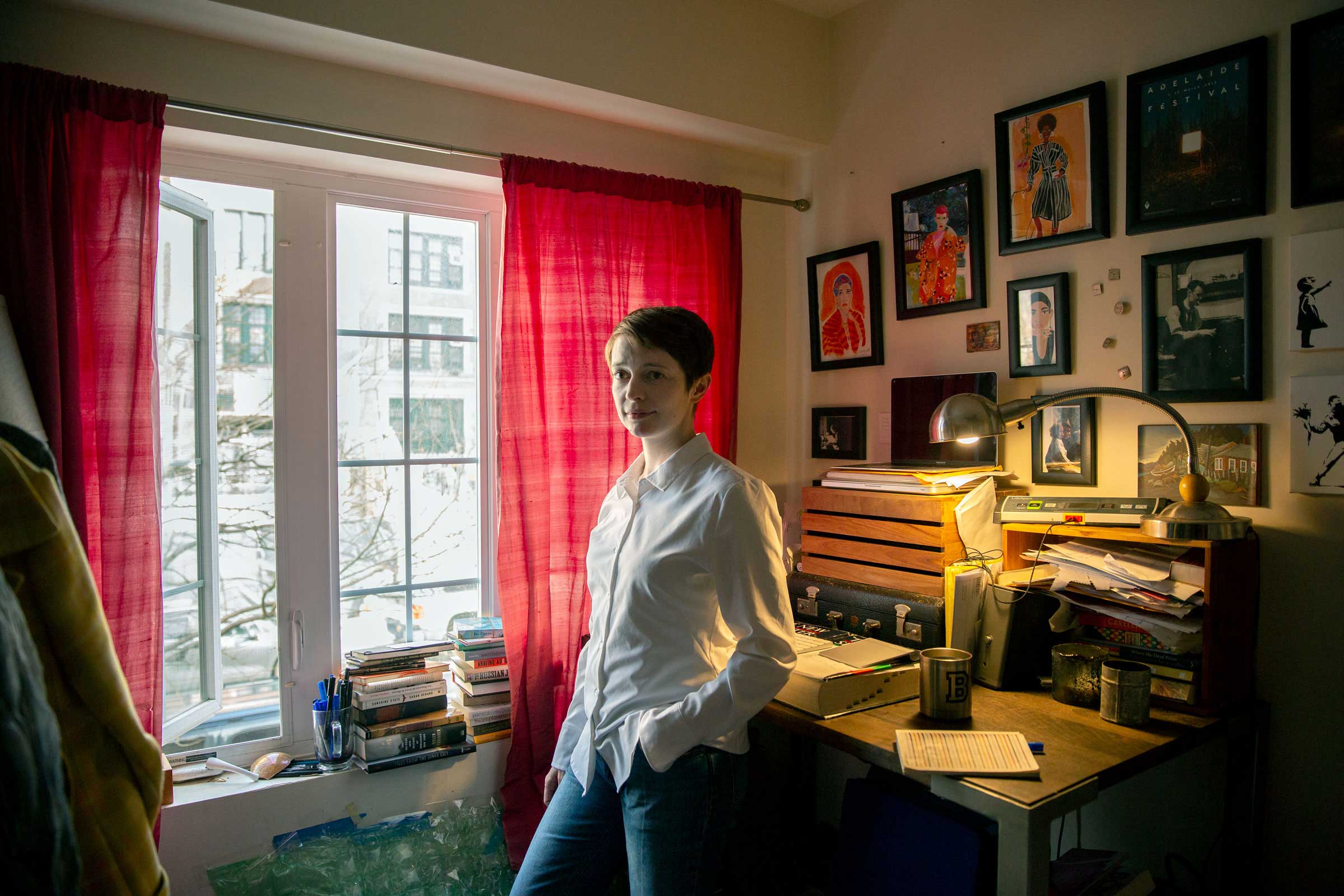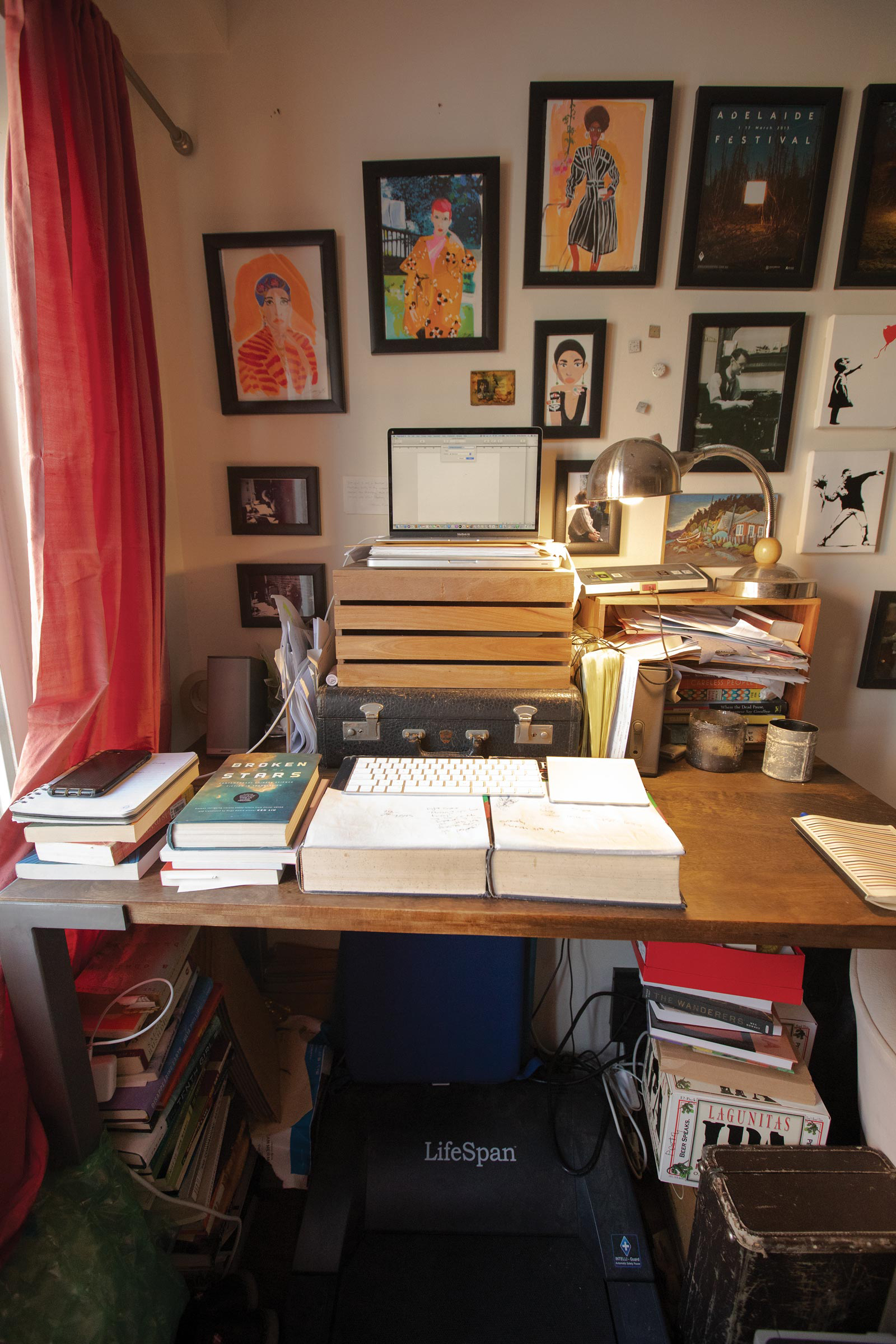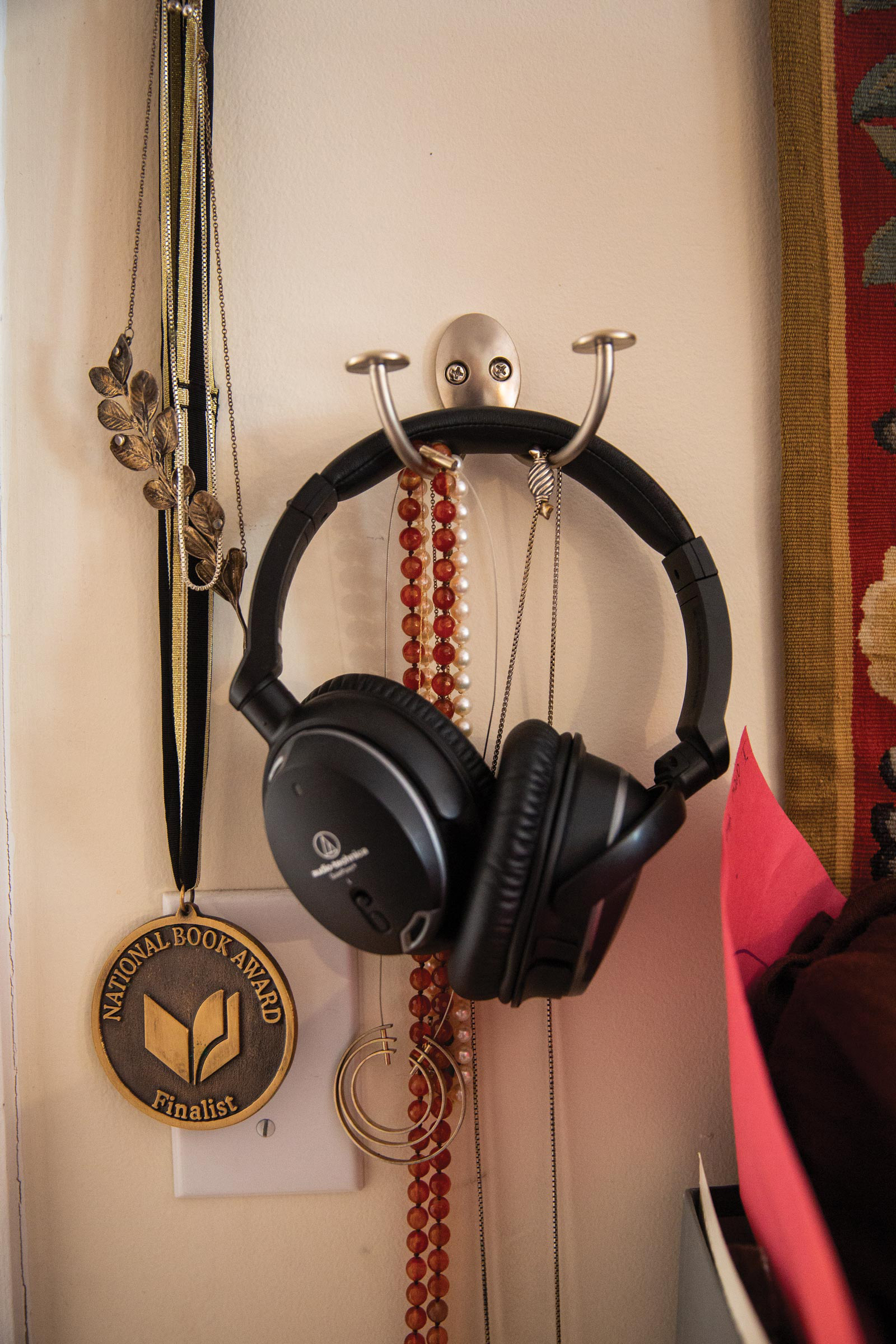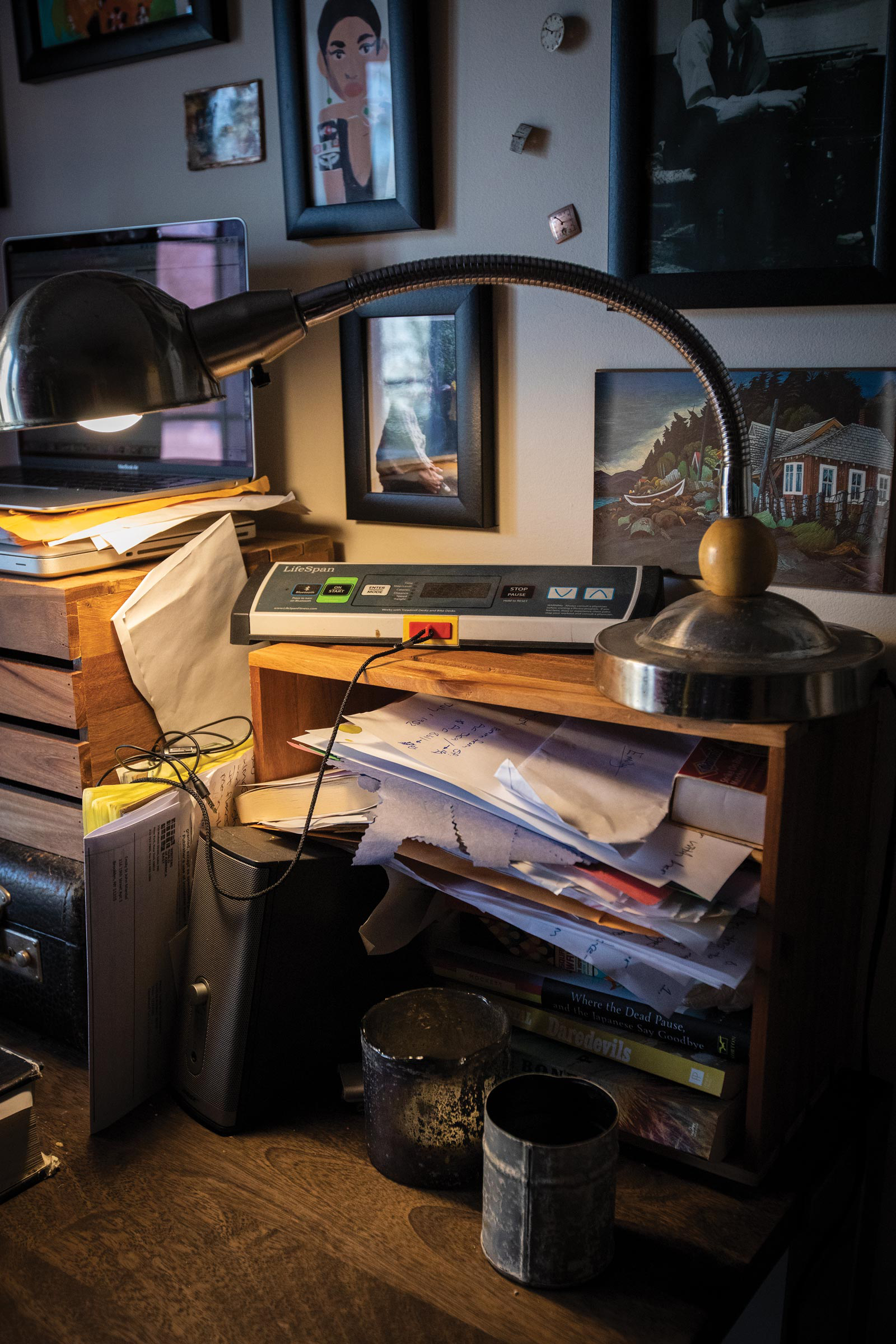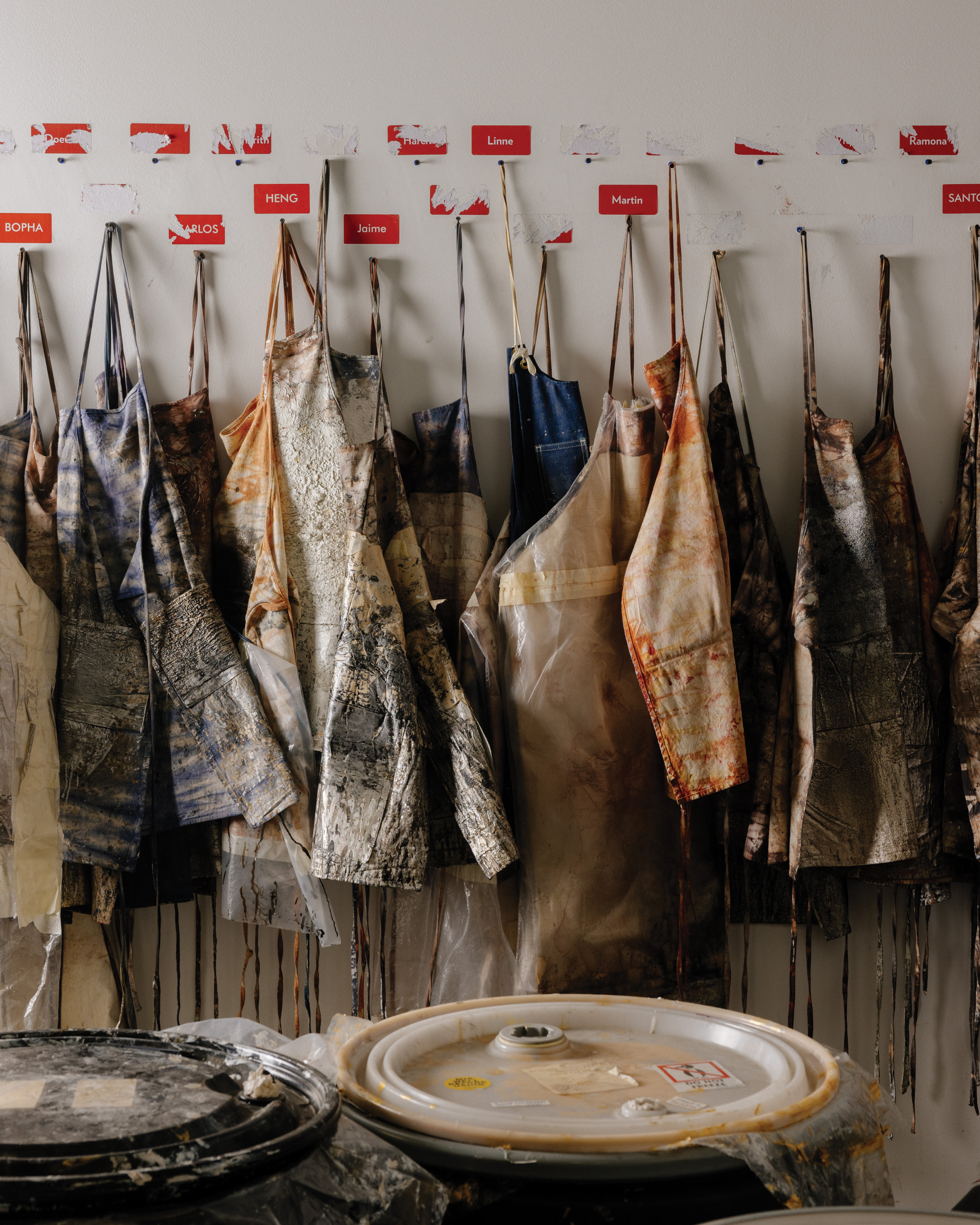There’s a little bit of chaos pervading the office of writer Emily St. John Mandel. When we visit, her Greenwood Heights home is under construction and, space being a complicated issue in Brooklyn, her office room has become a defacto storage room.
A couch turned on its side serves as a barricade, walling off about 1,000 books, though a couple dozen more that didn’t fit stand in precariously erect towers before it. Racks of clothes line the edges of the room, and two poofy lounge seats take up the remaining floor space not dedicated to her permanent office fixtures.
This tumultuous setup falls together like a metaphor, running parallel to the transitional period her life has taken on for the last six years—since her fourth novel, Station Eleven, a post-apocalyptic story wherein a pandemic wipes out 99% of humanity, was published to critical acclaim and subsequently shortlisted for a National Book Award. “There is inevitably a lot of pressure in following a novel that was really successful,” explains the 40-year-old author. “Before that I’d had three small-press books that really hadn’t sold very well. So Station Eleven feels like the before and after of my life; it’s this dividing line.
“It’s approximately the least sympathetic problem in the entire world; I’m not complaining,” Emily says, but it did make the process of writing her latest book, The Glass Hotel, longer—five years total—and more challenging than ever. “I was aware of this invisible audience looking over my shoulder in a way I’d never been before.”
Related | Manipulating Memory and Time with Author Blake Crouch
Born in the tiny unincorporated community of Merville on Vancouver Island, Emily and her family moved to nearby Denman Island (population: just over 1,000 and the inspiration for a setting in Station Eleven) when she was 10. She was homeschooled for most of her life, and ultimately never got her high school diploma or pursued higher education beyond a couple of community college semesters, choosing instead to audition for and attend the School of Toronto Dance Theatre.
- One permanent fixture is the treadmill desk Emily St. John Mandel made using a bar table, crate, and suitcase, so she can write and walk at the same time. Photo by Benjamin Norman
- While Emily St. John Mandel’s office doubles a bit as storage during her home’s renovation, she makes the most of every inch of space. Photo by Benjamin Norman
“I graduated from this dance program when I was 20 and I had this moment of realization,” she recalls, her doll-like eyes alive with excitement. “It just felt like more of a chore than a joy. And I realized I didn’t really want to do it anymore, which raised some obvious questions like, ‘OK, well I have no degree in anything, I still had a mountain of student loan debt from the dance school, so going back to school didn’t really feel like an option. So I started writing. I like the idea of being immersed in the grand project of a novel that takes years, and it’s this huge thing that you’re building.” She finished what eventually became her first novel, Last Night in Montreal, when she made her definitive move to New York City. In the two years and 35 publisher rejections it took to finally sell, she was already working on her second novel, The Singer’s Gun.
More than a decade later, Emily seems to look at everything she’s achieved with a guarded humility, top-lining each achievement with the caveat of how lucky she is to have achieved it, and likening her literary success to winning the lottery. She’s already working on a TV adaptation of The Glass Hotel, which she’s writing herself. And the TV adaptation of Station Eleven, of which she is not involved, is currently in the capable hands of HBO.
Working on The Glass Hotel pilot has been a new experience for her, and she’s excited to diversify her skills, knowing there’s no guarantee of success for her future novels, and that at some point lottery winnings run dry. “The good thing that inspires me is just a love of story. I love writing,” she says. “The bad thing that inspires me is, once you quit your day job, that’s how you’re paying your mortgage. So there is this awareness at the back of my mind that this is how I’m paying for my life. I can’t not make the deadline. I can’t not write the book. There’s a combination of financial horror and artistry.”
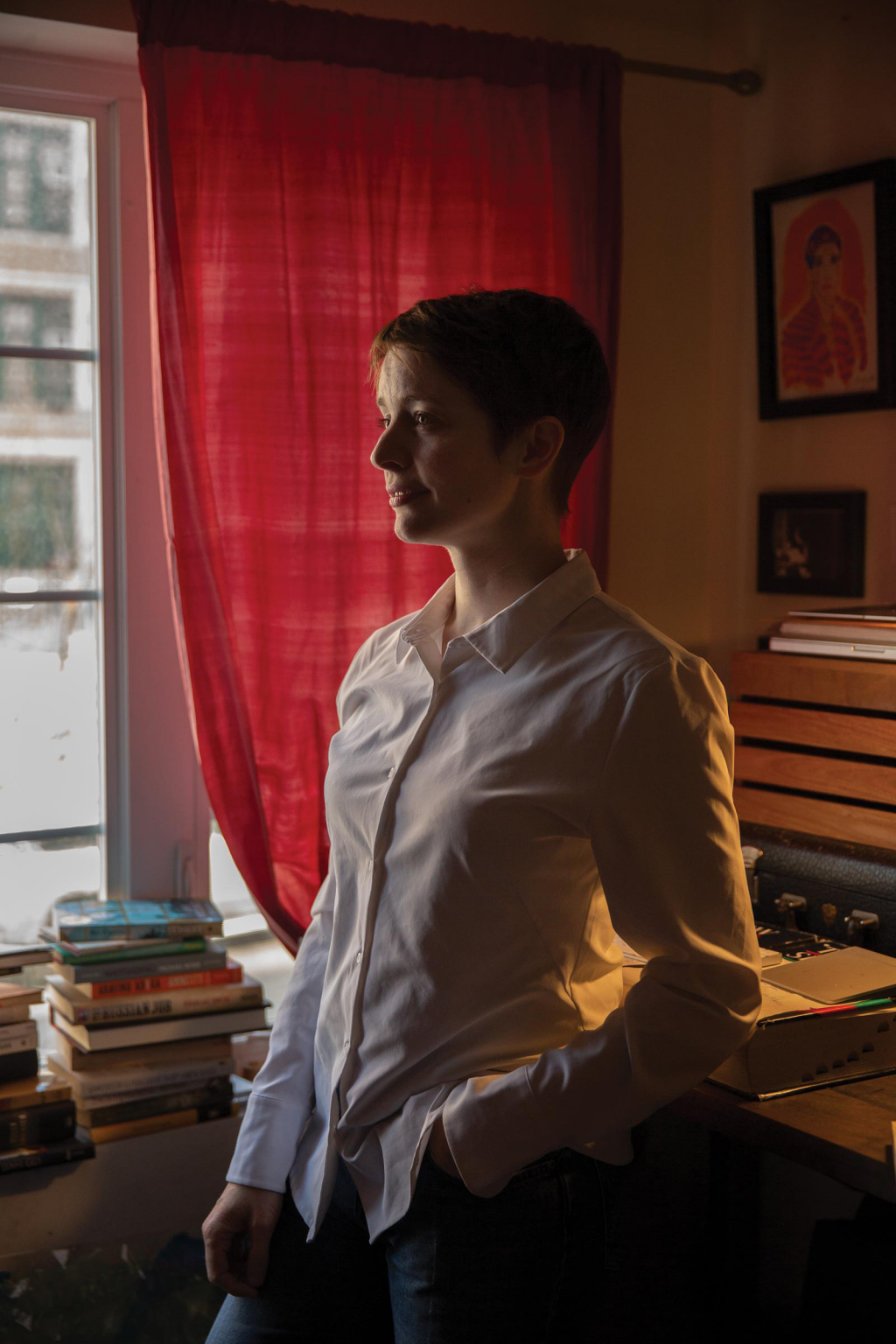
Having no formal training as a writer, Emily St. John Mandel instead brings a wealth of other experiences to her wildly successful novels. Photo by Benjamin Norman
Thanks to the success of Station Eleven, which took two-and-a-half years to write, she was able to quit her job as an administrative assistant at Rockefeller University’s Cancer Research Lab, a gig that helped finance the writing of her first four books. Then, while touring Station Eleven over 14 months, across seven countries and 200 events, Emily discovered she was pregnant with her daughter. “Having a kid does not speed up your writing process,” Emily says earnestly, sipping tea with perfect posture to fend off an oncoming cold. “I toured forever and then having a baby slowed me down a bit.”
Now, on a regular day, between dropping her daughter off at preschool in the morning and picking her up in the afternoon, Emily has about six hours to “do all of adult life.” This includes household and administrative tasks as well as writing, research, and pre-publication needs for The Glass Hotel—and giving interviews like this one.
In her home office, on a wall behind her desk crowded with photos of her family, framed posters, and paintings that range from Banksy-inspired art to bold, colorful figures, are a collection of tiny enamel pins in the shape of clocks in her direct line of sight. These remind her to not waste time, Emily says.
- Emily St. John Mandel’s 2014 book, “Station Eleven,” was a National Book Award finalist. Photo by Benjamin Norman
- Her workspace is meticulously optimized for multi-tasking, a testament to her mantra of efficiency. Photo by Benjamin Norman
Throughout her 20s and early 30s, Emily routinely turned down plans with friends and turned any free moments—a 30-minute lunch break at Starbucks, an hour-long commute home on the F train—into writing sessions. “The way I made that work was being socially ruthless because you never have enough time to write. If it’s not a job, it’s a child, or both.”
Her physical workspace, meticulously optimized for multi-tasking, is a testament to that mantra of efficiency. For instance, one of Emily’s permanent office fixtures is a treadmill fashioned into a treadmill desk with a Crate & Barrel bar table and a crate and suitcase stacked beneath her laptop to bring the screen to eye level. Her keyboard and trackpad rest on abridged dictionaries.
“It’s really hard to get enough exercise when you’re writing all day,” she says. Luckily, she’s adept at walking and writing for TV simultaneously, and will walk on her treadmill for two to three hours if she’s unable to get to the gym, channeling the determination of a former dancer. When writing a fiction novel as complex as The Glass Hotel, which veers in and out of characters’ perspectives, while fusing multiple timelines that span across decades, she prefers to be standing and stationary, perhaps because of the intense focus it requires to manipulate the narrative.

Emily St. John Mandel’s latest book, “The Glass Hotel” (March 2020), is a complex tale inspired by the 2008 financial crisis. Photo courtesy of Knopf
“It felt much more complicated than any of my previous books,” she recalls. From the onset, Emily was inspired by the mass delusion surrounding Bernie Madoff’s shady investment strategy to write about wealth and white collar crime. But what started as a book about a Ponzi scheme executed at the peak of the 2008 financial crisis turned into something of a ghost story. And while the flames of her novels often spark with one idea, her aversion to creating outlines, she explains, means her books meander in unexpected directions.
That, along with her signature non-linear timelines, causes some chaos around each story. When writing Station Eleven, Emily organized the narrative puzzle in an Excel spreadsheet; to map out The Glass Hotel, she used a database called Scrivener, dragging and dropping pieces of the story as the ideal structure came together. Still, the final manuscript felt unsettled in her mind. Adapting The Glass Hotel for TV is, for Emily, a chance to take the story in an entirely new path.
At the end of March Emily was set to embark on a two-month publicity tour for The Glass Hotel across the US, Canada, and the UK—this time, with a living, breathing toddler and husband waiting at home, and this time, with a screenwriting gig on the line. Plus, she already has an idea for her next novel. “I think something I’ve gained from parenthood that’s probably not uncommon, is, actually, I can do anything,” she says. “I probably will drink a lot of coffee and not sleep quite enough, but I think it’s doable.”
This article originally appeared in the Spring/Summer 2020 issue of Sixtysix with the headline “Emily St. John Mandel: Writer.” Subscribe today.
